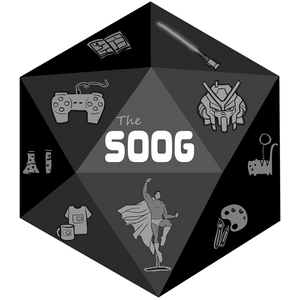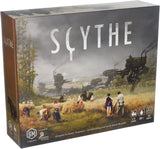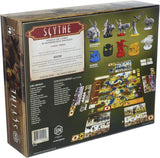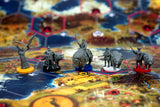It is a time of unrest in 1920s Europa. The ashes from the first great war still darken the snow. The capitalistic city-state known simply as “The Factory”, which fueled the war with heavily armored mechs, has closed its doors, drawing the attention of several nearby countries.
Scythe is an engine-building game set in an alternate-history 1920s period. It is a time of farming and war, broken hearts and rusted gears, innovation and valor. In Scythe, each player represents a character from one of five factions of Eastern Europe who are attempting to earn their fortune and claim their faction's stake in the land around the mysterious Factory. Players conquer territory, enlist new recruits, reap resources, gain villagers, build structures, and activate monstrous mechs.
Each player begins the game with different resources (power, coins, combat acumen, and popularity), a different starting location, and a hidden goal. Starting positions are specially calibrated to contribute to each faction’s uniqueness and the asymmetrical nature of the game (each faction always starts in the same place).
Scythe gives players almost complete control over their fate. Other than each player’s individual hidden objective card, the only elements of luck or variability are “encounter” cards that players will draw as they interact with the citizens of newly explored lands. Each encounter card provides the player with several options, allowing them to mitigate the luck of the draw through their selection. Combat is also driven by choices, not luck or randomness.
Scythe uses a streamlined action-selection mechanism (no rounds or phases) to keep gameplay moving at a brisk pace and reduce downtime between turns. While there is plenty of direct conflict for players who seek it, there is no player elimination.
Every part of Scythe has an aspect of engine-building to it. Players can upgrade actions to become more efficient, build structures that improve their position on the map, enlist new recruits to enhance character abilities, activate mechs to deter opponents from invading, and expand their borders to reap greater types and quantities of resources. These engine-building aspects create a sense of momentum and progress throughout the game. The order in which players improve their engine adds to the unique feel of each game, even when playing one faction multiple times.
-
1–5 Players
-
90–115 Min
AWARDS & HONORS
- 2017 Scelto dai Goblin Winner
- 2017 Lys Passioné Finalist
- 2017 Jogo do Ano Nominee
- 2017 International Gamers Award - General Strategy: Multi-player Nominee
- 2017 Gra Roku Best Original Artwork Winner
- 2017 Gra Roku Advanced Game of the Year Nominee
- 2017 Goblin Magnifico Nominee
- 2017 Best Science Fiction or Fantasy Board Game Nominee
- 2017 As d'Or - Jeu de l'Année Expert Winner
- 2017 As d'Or - Jeu de l'Année Expert Nominee
- 2016 Tric Trac Nominee
- 2016 Tric Trac d'Or
- 2016 Swiss Gamers Award Winner
- 2016 Swiss Gamers Award Nominee
- 2016 Meeples' Choice Nominee
- 2016 Golden Geek Most Innovative Board Game Nominee
- 2016 Golden Geek Board Game of the Year Winner
- 2016 Golden Geek Board Game of the Year Nominee
- 2016 Golden Geek Best Thematic Board Game Winner
- 2016 Golden Geek Best Thematic Board Game Nominee
- 2016 Golden Geek Best Strategy Board Game Winner
- 2016 Golden Geek Best Strategy Board Game Nominee
- 2016 Golden Geek Best Solo Board Game Winner
- 2016 Golden Geek Best Solo Board Game Nominee
- 2016 Golden Geek Best Board Game Artwork & Presentation Winner
- 2016 Golden Geek Best Board Game Artwork & Presentation Nominee
- 2016 Cardboard Republic Architect Laurel Nominee
- 2016 Board Game Quest Awards Game of the Year Nominee
- 2016 Board Game Quest Awards Best Strategy/Euro Game Winner
- 2016 Board Game Quest Awards Best Strategy/Euro Game Nominee
- 2016 Board Game Quest Awards Best Production Values Nominee






